Darn, I should have known I was following in a great man’s footsteps…
http://www.code4lib.org/2007/durfee
Anyway, a couple more hours of coding has resulted in this…
http://161.112.232.18/modperl/facet6.pl?q=medicine
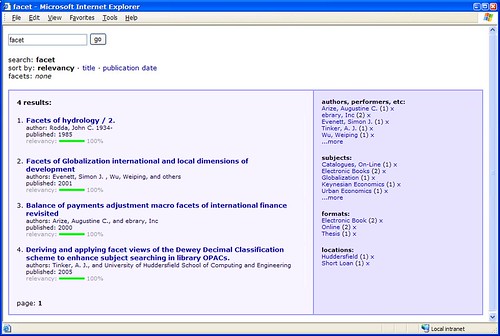
Hopefully NCSU won’t be setting their lawyers on me (copying is the most sincere form of flattery!), but the prototype has certainly borrowed one or two ideas from their wonderful OPAC.
It’s still a way off being a full OPAC replacement and I need to shrink the book covers down to a more sensible size, but I’m quite chuffed with what I’ve been able to achieve in just a few hours of coding.
Category: Library Stuff
Arrghhhhh – Change!
I’m sure Stephen Abram posted his “Change — Arrghhhhh!” article with all of the best intentions in the world, but unfortunately it’s not gone down well with some of the customers…
I assure you, most of us handle change quite well and if none of us wanted major change we wouldn’t be upset about the decision to trash 8.0. In fact, we have asked, begged and demanded change for years and we finally thought we were about to get some. Instead that long awaited “change” has once again been flushed down the toilet.
I was reminded of a stern grownup telling a child that he must take his cod liver oil, because it’s good for him. And I might, if I thought the New Improved Cod Liver Oil had distinct advantages over the old cod liver oil I’ve been taking for years. Problem is, I’m not convinced.
…an incredibly insulting commentary
I also think the article on change has to rate as one of the most offensive and tasteless exercises in corporate public relations ever done.
I must admit that when I read the article, my initial reaction was “what on earth was Stephen thinking when he wrote it?”. Anyway, with a quick shrug of the shoulders, I went back to doing some more coding on the Solr OPAC and the subsequent release of endorphins made me feel much happier! 🙂
I’d definitely be interested to know what some of the Unicorn sites thought of the article.
Solr + 2 hours = faceted OPAC
I’ve been meaning to have a play around with Solr, which is…
an open source enterprise search server based on the Lucene Java search library, with XML/HTTP and JSON APIs, hit highlighting, faceted search, caching, replication, and a web administration interface
It’s mostly the “faceted” part I’m interested in and, after a couple of hours of messing around, I’ve got a basic OPAC search interface up and running with around 10,000 records pulled in from our catalogue.
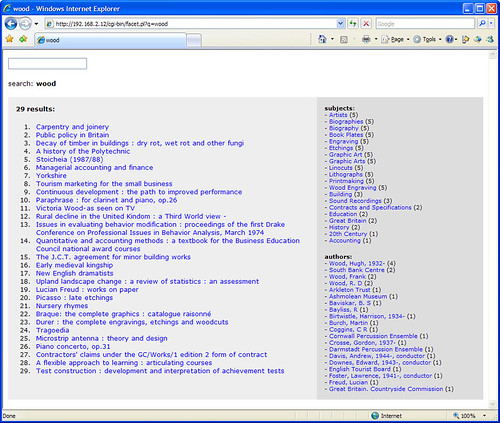
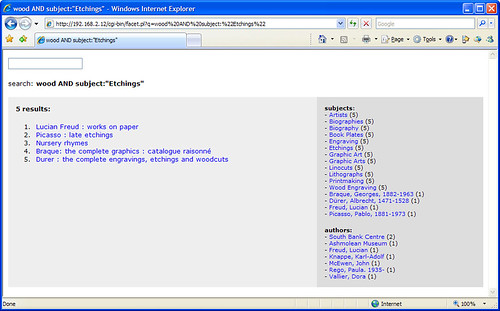
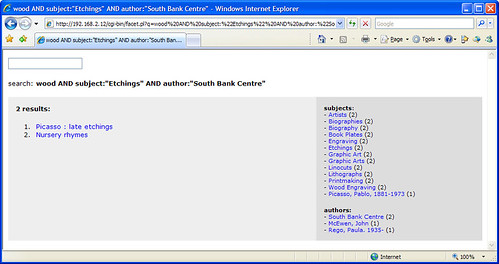
It looks like Solr automatically handles word stems, as searches for “score”, “scores”, and “scoring” find the same results. The results are also relevancy ranked, although I need to find a way to fine tune the default ranking algorithm.
All in all, I’m very impressed with what Solr can do and how quickly it handles searches.
Eeeek – my cloud has spam!
Apologies to anyone who’s picking up the “hot stuff” tag cloud feed of library/librarian weblogs — unfortunately one of the blog feeds that it aggregates has gone down with a nasty case of spam…

Rest assured that the Monty Python Vikings are currently rampaging their way through the blog feed database and masticating all of that lovely spam…
[youtube http://www.youtube.com/watch?v=ODshB09FQ8w]
“Spam spam spam spam. Lovely spam! Wonderful spam! Spam spa-a-a-a-a-am spam spa-a-a-a-a-am spam. Lovely spam! Lovely spam! Lovely spam! Lovely spam! Lovely spam! Spam spam spam spam!”
SirsiDynix Rome Sweepstake #1 – EDIFACT
Will SirsiDynix Rome support the EDIFACT standard from day 1? The US office says “no” and “probably not”, whilst the UK office says “yes”.
For UK customers, EDIFACT is pretty much an essential requirement for running a library. In fact, I suspect most libraries outside of the US require it.
So, will the first release of Rome have EDIFACT or won’t it? As the US will be doing the development, I suspect the answer might be “no”, but I’m sure I’ll shortly receive another telephone call from the UK office to say “yes” (if only to even up the scores at two all).
SirsiDynix to build Rome OPAC on Evergreen
Finally some proof that the new management at SirsiDynix are listening to their customers! I really shouldn’t post this until SirsiDynix make the official announcement on Thursday, but I just have to spill the beans because I’m so excited about the news…
Since the announcement of Rome, many Dynix and Horizon sites have been discussing a move to open source systems (such as Koha and Evergreen) and it looks like the top brass at SirsiDynix have realised that “if you can’t beat them, join them” — on Thursday they’ll be announcing a partnership with the people at Georgia Public Library Service who develop the Evergreen system.
How did I find out about this? Well, a couple of years ago I was given access to the Dynix development website and I regularly check it to see what the company has in the software pipeline. Imagine my surprise when I spotted a link titled “Evergreen Partnership OPAC” this morning — what could I do but click to see what is was!
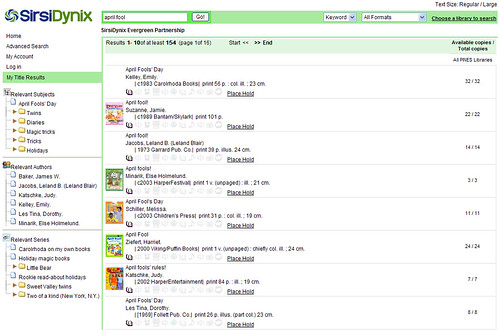
I honestly thought that SD staff might have put it on there as some kind of joke, but a quick phone call to the press office at Huntsville confirmed the news and also that the formal announcement would come before the end of the week. They did ask me to swear that I wouldn’t leak the news, but I had my fingers crossed at the time so it doesn’t count!!! 😀
This is really great news as the Evergreen OPAC has a host of features not currently available in most ILS vendor OPAC products (including facets and lots of cool AJAX stuff).
Quick OPAC Survey – update 1
Wow — the OPAC survey has now had over 650 responses! I really can’t say this enough times, but thanks to everyone who has responded so far.
http://www.daveyp.com/files/stuff/opac.html
The survey has already been posted on the SirsiDynix Horizon and IPAC mailing lists, but it would be great to get more responses from the users of other systems. If anyone is willing to post a link to the survey in a mailing list for any of the other systems, then please do.
I’m planning to close the survey on Saturday 14th April and will post the main results on (or before) April 17th. Quite a bit of the data will be included in the presentation I’m giving at LiS 2007 on the 18th.
The full results from the survey will be published in an informal report sometime around the middle of May. This report will include:
- all of the comments from the respondents
- tables of the data, broken down by multiple criteria
- lots of pretty graphs(!)
- conclusions and predictions based on the data
The comments alone currently run to nearly 40 pages and provide a unique insight into our love/hate relationship with the OPAC.
As a taster of things to come, here are some breakdowns taken from the responses to date…
Countries represented
There have been responses from virtually every corner of the globe and the current breakdown is as follows (based on IP address of respondent):
- Australia — 21
- Canada — 41
- Germany — 2
- Greece — 2
- Hong Kong — 2
- Ireland — 3
- New Zealand — 8
- Sweden — 4
- UK — 155
- USA — 408
China, Denmark, Italy, Lebanon, Luxembourg, Netherlands, Peru, and Spain have all had 1 respondent each.
I’ve yet to do a full breakdown of results by all countries, but here are some of the facts for the countries where there have been at least 10 responses:
- Canadians are the least happy with their OPACs (4.37 out of 10) whilst the UK is the happiest (5.81 out of 10)
- The UK respondents generally think the OPAC features listed in the survey are less important than the rest of the world does
- Australians suffer the most from “OPAC envy” with 86% saying they’d experienced it (or perhaps Aussies are the most honest people in the world?)
- Respondents from the UK were the least likely to experience envy with just 72% admitting to it
- Australians are the most likely to offer OPAC training to their users (81%) and Canadians the least likely (61%)
Library type
As mentioned before, I’ve kicked myself for not asking respondents to say what type of library they are from. However, I added the question to the survey a couple of days ago and nearly 160 respondents have replied since then. The breakdown is:
- academic — 92
- public — 45
- other — 14
- school/K12 — 6
It would be great to get some more responses to bump those figures up, but here’s how academic and public libraries compare so far:
- publics rate the “people who borrowed this” feature more highly (7.6 out of 10 compared to 6.2 for academics)
- publics rate enriched content (book covers, etc) slightly more highly (8.9 out of 10 compared to 8.5 for academics)
- academics rate facetted browsing more highly (8.1 out of 10 compared to 7.3 for publics)
- publics rate user supplied comments much more highly (7.3 out of 10 compared to 5.9 for academics)
- publics rate user supplied ratings much more highly (7.1 out of 10 compared to 5.3 for academics)
- academics are much more likely to offer OPAC training to their users (74% compared to 53% of publics)
…apart from the above, the responses from public libraries and academic ones have been very similar.
OPAC features
I’ve got some really exciting data here that I’m going to hold off from posting it all until the survey closes (I’m such a tease!).
If you take the Crossing the Chasm adoption curve and apply the boundary values from the more well known Technology Adoption LifeCycle (E.M. Rogers)…

- Innovators — 2.5%
- Early Adopters — 13.5%
- Early Majority — 34%
- Late Majority — 34%
- Laggards — 16%
…then the current state of play of the 10 OPAC features in the survey (calculated from the number of respondents who said that they had already implemented the feature) is:
Innovators:
- OPACs that make personalised suggestions (like Amazon does)
- “people who borrowed this” suggestions
Early Adopters:
- user supplied tagging
- facetted browsing
- user supplied comments
- user supplied ratings
- “did you mean” spelling suggestions
- RSS feeds
- embedding the OPAC into other places
Early Majority:
- enriched content (book covers, etc)
…in other words, only enriched content has jumped “the chasm” into mainstream acceptance.
If we assume that everyone who said that they were planning to implement a feature soon actually does so before the end of 2007, then 3 of the 7 features currently in the Early Adopters group will also have jumped the chasm to reach Early Majority (and mainstream acceptance?) by the start of 2008 — can you guess which 3 they are?
Also, if we continue with that assumption, the 2 features currently in the Innovators group will have moved into the Early Adopters group.
So, if you are craving these “more cowbell” features, it would appear that all of them are taking little baby steps towards an OPAC near you. How long each of them will take to arrive is the next big question and I’ll be offering some informed speculation based on the data once the survey has closed!
Quick OPAC Survey
I’m giving a short presentation about OPACs at the Library and Information Show in April and I’d be really grateful to any librarians reading this blog post who would be happy to respond to a quick survey about the subject:
http://www.daveyp.com/files/stuff/opac.html
I’m planning to include results from this quick survey in my presentation and I’ll post the full results here on the blog.
Many, many thanks in advance to anyone who responds!
Revish and reviews
Just spotted that Revish are gearing up for launching at the end of March 🙂
On the blog, Dan mentions that the site will provide APIs for getting at the data and I can’t wait to see if we can do anything with that data in our OPAC.
I quietly flicked on the ability to add reviews and comment to our OPAC last week, but we’ve yet to have our first student generated comment. This has slightly surprised me (i.e. made my right eyebrow rise by about 3mm) as we’ve already had several hundred book ratings added in the last few weeks. However, adding a rating doesn’t require you to login but adding a comment does (at the request of our Librarians).
If we don’t get any bites soon, I’ll probably tweak the code to allow anonymous comments. These will need to be fully moderated, as it seems these days that any HTML <form> on a public web page will attract spam 🙁
However, it does raise some interesting questions:
- Is having to login to post comments too much of a barrier?
- Are public library users (e.g. those at AADL) more likely to post comments/reviews than students at an academic library?
- What motivates someone to write a review/comment?
- Have I finally managed to code an OPAC tweak that no-one will use?
- Did I leave the iron on?
Hey, whatcha lookin’ at?
Just for the heck of it, I’ve started logging details of the full bib pages displayed in the OPAC to get a feel for what are the most looked at books. Once we’ve got enough data, it’ll be interesting to cross reference that with the actual number of physical copies we own for each title and whether or not a copy was checked out shortly after it was looked at.
In the meantime, here’s another “wall of books” to feast your eyes on…
top 50 most looked at books on the OPAC in the last 7 days
(I don’t have 7 days of data yet, but not to worry!)
Heh – glad to see the following funky book made it into the initial top 50 🙂
